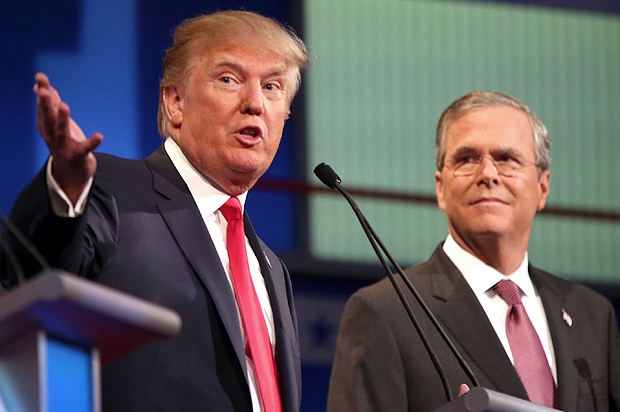Every week, Jeb Bush reminds us why he’s a terrible presidential candidate. Despite all his money and all his connections, he can’t compete with bumbling outsiders like Donald Trump and Ben Carson. Trump has been particularly bad for Bush, applying just enough pressure to make his already apparent awkwardness nearly unbearable. Trump, as Heather Digby Parton pointed out this morning, has continued to pummel Jeb by reminding everyone who his brother is.
Trump and Bush’s spat began in earnest at the last Republican debate, when a flustered Bush responded to Trump’s criticism of George W. by saying his brother “kept us safe.” This refrain, as I wrote at the time, only makes sense if you refuse to think about it. It’s obvious enough that 9/11 occurred on George W. Bush’s watch – there really isn’t anything to debate on this front.
In an interview with Bloomberg last week, Trump re-opened this conversation by blaming (in part, at least) George W. for 9/11: “When you talk about George Bush, I mean, say what you want, the World Trade Center came down during his time…He was president, OK? Blame him, or don’t blame him, but he was president. The World Trade Center came down during his reign.”
Jeb, evidently still blind to his brother’s awful record, couldn’t help but fire back with a tweet of his own:
How pathetic for @realdonaldtrump to criticize the president for 9/11. We were attacked & my brother kept us safe.
— Jeb Bush (@JebBush) October 16, 2015
I understand the power of cognitive dissonance, but this is getting ridiculous. George W. Bush was sworn in on January 20, 2001. He received a memo warning of an imminent terrorist attack on August 6, 2001. And on September 11, 2001, we were attacked. There’s nothing confusing about that chronology.
Yesterday Bush appeared on CNN’s “State of the Union” to defend his brother once again, and the results were unsurprising to say the least, particularly when the conversation turned to Benghazi and President Obama:
Tapper: Obviously al Qaeda was responsible for the terrorist attack on 9/11. But how do you respond to critics who ask if your brother and his administration bear no responsibility at all, how do you then make the jump that President Obama and Secretary Clinton are responsible for what happened at Benghazi?
Bush: Well I — the question on Benghazi which, is hopefully we’ll now finally get the truth to, is was the place secure? They had a responsibility, the Department of State, to have proper security. There were calls for security, it looks like they didn’t get it. And how was the response in the aftermath of the attack, was there a chance that these four American lives could have been saved? That’s what the investigation is about, it’s not a political issue. It’s not about the broad policy issue, is were we doing the job of protecting our embassies and our consulates and during the period, those hours after the attack started, could they have been saved?
Tapper: Well that’s, that’s kind of proving the point of the critics I was just asking about, because you don’t want to have your brother bear responsibility for 9/11 and I understand that argument and Al Qaeda’s responsible, but why are the terrorists not the ones who are responsible for these attacks in Libya?
Bush: They are, of course they are but — of course they are, but if the ambassador was asking for additional security and didn’t get it, that’s a proper point and if it’s proven that the security was adequate compared to other embassies, fine, we’ll move on.
The failure of logic here is transparent, as Digby explained earlier today. What will be interesting to watch, however, is how Republican voters respond to this over time. At the debate, the crowd cheered overwhelmingly for Jeb when he insisted his brother “kept us safe.” And that wasn’t unexpected. There is a kind of amnesia on the right when it comes to George W. Bush’s record. No one in the GOP appears to remember anything bad that happened before Obama took office. The military misadventures, the recession, the bailouts, the fiscal recklessness – it’s as though history began the day Obama was inaugurated and the antecedent causes of current disasters are just phantoms of the liberal imagination.
That’s why there’s a good chance this Trump-Bush squabble will actually help Bush in the short-term. Because they conveniently forgot how dreadful he was, George W. remains popular among the conservative base. So Jeb’s defense of his brother may score him some points with this crowd. The problem, though, is that the rest of the country doesn’t suffer this delusion. If you don’t live in the conservative echo chamber and were awake before 2009, you know George W. Bush was a terrible mistake. In a general election, therefore, Jeb’s decision to align himself with his brother’s record will destroy him.
If Jeb were a better candidate, he’d know that. But he isn’t, and so he doesn’t have many options at this point.

